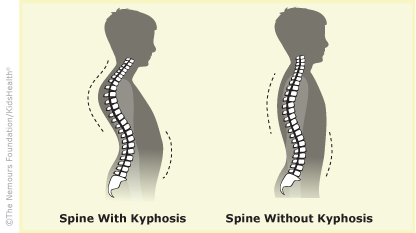Kyphosis (for Teens) (original) (raw)
What Is Kyphosis?
Kyphosis (pronounced: kye-FOH-sis) makes a person's spine rounded so the back looks hunched over. Everyone has some rounding of the spine. But a larger rounding than normal can cause health problems like pain and breathing trouble.
Doctors sometimes treat kyphosis with back braces and physical therapy. A larger curve might need surgery.
What Are the Signs & Symptoms of Kyphosis?
The main signs of kyphosis are:
- A rounded, hunched back. Sometimes the rounding is hard to see. Other times it's more noticeable. Some teens can't straighten their curve by standing up and some can.
- Back pain. Some teens with kyphosis have back pain.
The signs of kyphosis often become obvious during the growth spurt that happens around puberty.

What Are the Kinds of Kyphosis?
There are three main types of kyphosis:
- Congenital kyphosis: This means someone is born with it. Even though it has been there since birth, sometimes it isn't noticed until a teen has done a lot of growing.
- Postural kyphosis: Teens who slouch over a lot can develop a rounded back. The muscles and bones get used to being hunched over. Teens with this type of kyphosis can straighten their curve by standing up.
- Scheuermann's kyphosis: Viewed from the side, normal vertebrae look like stacked rectangles. In Scheuermann's kyphosis, the vertebrae are triangles, or wedge shaped. This makes the spine hunch forward. Kids with this kind of kyphosis aren't able to straighten their curve by standing up straight.
What Causes Kyphosis?
The causes of kyphosis depend on the type:
- Congenital kyphosis: Doctors don't know exactly why some kids are born with this.
- Postural kyphosis: This happens to many people, especially those who look down a lot of time, such as at schoolwork or a phone.
- Scheuermann's kyphosis: Doctors don't know the exact cause, but it runs in families.
How Is Kyphosis Diagnosed?
To diagnose kyphosis, a doctor or nurse will:
- examine the spine: while you stand, bend from the waist, and lie down
- get X-rays: to see the curve
How Is Kyphosis Treated?
Someone with kyphosis will see an orthopedist (a specialist who treats conditions involving the bones). The orthopedist will examine the spine, look at the X-rays, and recommend treatment.
Postural kyphosis is treated with physical therapy to improve posture. Exercises can strengthen the back muscles to help them better support the spine.
For congenital and Scheuermann's kyphosis, treatment options include:
Observation. This means routine checkups to make sure the rounding isn't starting to cause problems. Treatment might not be needed. Most cases will stop progressing when teens are done growing.
Back brace. Sometimes specialists recommend a back brace. This brace is like a jacket that can be worn under clothes. It won't straighten the curve, but for some kids and teens it could keep the curve from getting worse. Some wear the brace only at night while others might wear it for 18–20 hours a day. The brace is usually worn until someone stops growing.
Physical therapy. Exercises that strengthen the muscles in the back and abdomen to better support the spine can sometimes help.
Surgery. Surgery isn't usually needed. But doctors might recommend a procedure called a spinal fusion for a severe case that causes pain, or to prevent problems in the future.
What Else Should I Know?
If you have back pain or notice a rounded upper back, talk to your parent about seeing your doctor or nurse.
Date reviewed: January 2022
/content/kidshealth/misc/medicalcodes/teens/articles/kyphosis